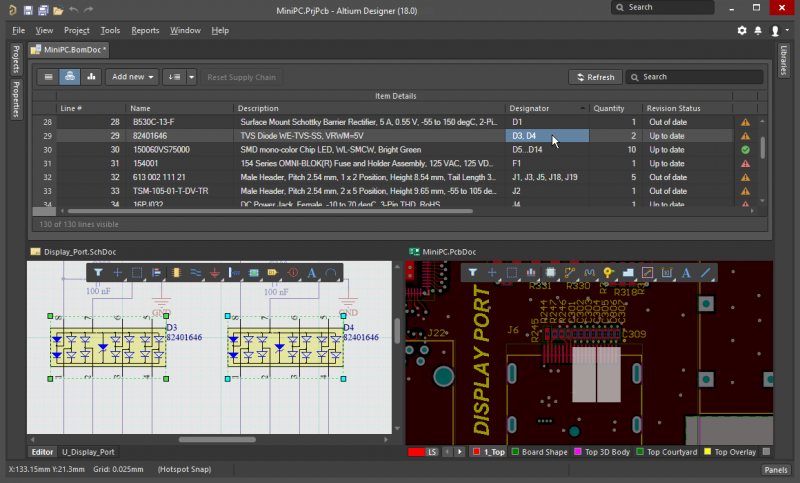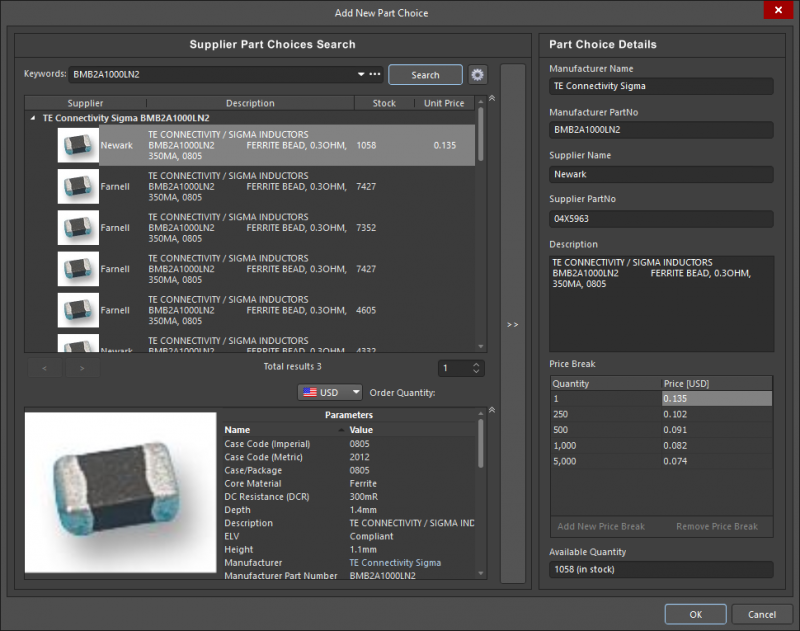Protel PCB Design Software has Rebranded to Altium Designer
Protel PCB isn’t gone, it has been rebranded and enhanced as Altium Designer.
ALTIUM DESIGNER
The most powerful, modern, and easy-to-use PCB design tool for professional use.
You don’t have to look very hard to find software such as Protel PCB design software or Diptrace still in use. Since the mid-1980s, Protel has been used for PCB design in companies all over the world as well as in universities for teaching circuit design and in homes for the hobbyist. The question that often comes up though is whatever happened to Protel?
The answer is that Protel is still right here and better than ever, although it is now known as Altium Designer 365. As Protel, it made history as one of the first PCB design tools created for the personal computer. As Altium Designer it carries on that advanced legacy by continually pioneering new and innovative tools that specialize in all aspects of the PCB design process. Starting with Protel, Altium has over 30 years of experience in creating cutting-edge design software. Today that PCB file experience has culminated in the best PCB design tools available on the market today, Altium Designer. Now you can sign up for Altium Designer.
A Powerful PCB Design Platform
To give you the power that you need as a PCB designer for today’s challenging designs, Altium Designer has been rebuilt from the ground up. Now structured on a 64-bit multithreading system’s architecture, Altium Designer is ready to put its power to work for you. Altium Designer also features a unified design environment providing commonality between its tools.
With the same data format used throughout the entire design, going in and out of the different tools is simple and straightforward without the need for complicated interfaces and translators. This is very apparent when you work with the advanced schematic editor to create complex hierarchical and multi-channel designs for simulation and layout. From the schematic editor through the PCB editor, Altium Designer has the power you will need.
Altium Designer is Equipped with the System Resources You Need
There’s no need to worry that yesterday’s tools will fall short on today’s designs, Altium Designer has all the strength you need for any of your design challenges.
- With its 64-bit multithreading architecture, Altium Designer is far more powerful than its predecessor Protel.
Learn More about the powerful PCB design platform that makes up Altium Designer.
- Altium Designer’s unified design environment eliminates the hassle of trying to synch up your design with different software systems.
Learn More about the advantages of Altium Designer’s unified design environment.
- From simple one-sheet schematics to complex hierarchical multi-channel designs, Altium Designer’s schematic editor has what you need for your next design.
Learn More about schematic capture using Altium Designer’s advanced schematic editor.

Altium Designer’s unified design environment allows you to easily work between tools
Advanced Place and Route Tools
From the beginning with Protel, Altium has featured strong place and route tools as the core of its PCB design software. Now in Altium Designer, these tools are more advanced than ever before. With smart placement algorithms, you will be able to quickly organize and position your components for the most optimum placement. Interactive PCB routing has never been better with Altium Designer’s intelligent routing tools to help you finish your PCB routing in record time. And with Altium Designer’s native 3D environment, you will be able to quickly verify your component placement to imported mechanical design data to check for clearance to enclosures or other mechanical features. If there is a conflict, you can easily adjust the position of your component placement all while working in 3D. Altium Designer 365 has enhanced and updated its core layout functionality to give you the state-of-the-art tools that you need.
Intelligent Place and Route Tools Complimented by a 3D Environment
This isn’t your father’s Protel anymore, Altium Designer’s layout tools will make your place and route tasks quick and error free.
- Positioning your PCB components will go fast with the smart placement features in Altium Designer.
Learn More about smart component placement utilities in Altium Designer.
- Altium Designer puts many different interactive routing tools at your disposal to help you with your trace routing.
Learn More about Altium Designer’s intelligent routing tools.
- Not only will you benefit from seeing your design in 3D, but checking and adjusting your placement in 3D against imported mechanical data will be a tremendous help to you.
Learn More about moving components with the help of Altium Designer’s native 3D environment.

Active BOM is just one of the many advanced tools you will find in Altium Designer
Design Utilities Above and Beyond Place and Route
As you know, in today’s world there’s a lot more to PCB design than just schematic capture and circuit board layout. To stay competitive, you need to up-to-date component information, advanced auto routing tools, and automated PCB file creation utilities to name a few of today’s requirements. Altium knows this and has been enhancing its software for years in order to add the tools and functionality that you need into Altium Designer.
Altium Designer comes with Active BOM, a bill of materials management tool that gives you another data portal into your design. With Active BOM you will be able to access component data directly and cross-select those components into the schematic or PCB layout. Active BOM also features a cloud connection with your preferred vendors to give you up-to-date information on pricing, availability, and data on your components.
With Active Route you will be able to create precise manual routing results with the speed of an auto router. Active Route enables you to guide the routing where you want it to go, and then complete the routing for you. Once your routing is finished, Altium Designer is ready to help you again with Draftsman, an automatic manufacturing drawing generator. From component selection to final CAD files, Altium Designer has the tools you need to get the job done.
Altium Designer is Ready to Help You with Advanced Utilities and Functionality
To stay competitive you need more than place and route functionality in your PCB design software, and Altium Designer has what you need.
- Connect with your vendors for current circuit board and component information to appropriately manipulate that data in your design using Active BOM in Altium Designer.
Learn More about real-time BOM management using Active BOM in Altium Designer.
- Do you want to route your circuit board tracks faster, but you don’t like the results of a traditional auto router? Altium Designer has the answer for you with Active Route, a user-guided auto router.
Learn More about user-guided auto routing with Altium Designer’s Active Route.
- When the circuit board design is finished and ready to out, you still need to create your manufacturing drawings. Let Altium Designer’s Draftsman auto-generate those drawings for you.
Protel set the bar high when it became one of the first advanced PCB design tools available for the personal computer. Now Altium Designer continues to move that bar up with each new advancement and enhancement. Come take a look at the design software that has been the bright spot of the industry for the past 30 years; Altium Designer.
